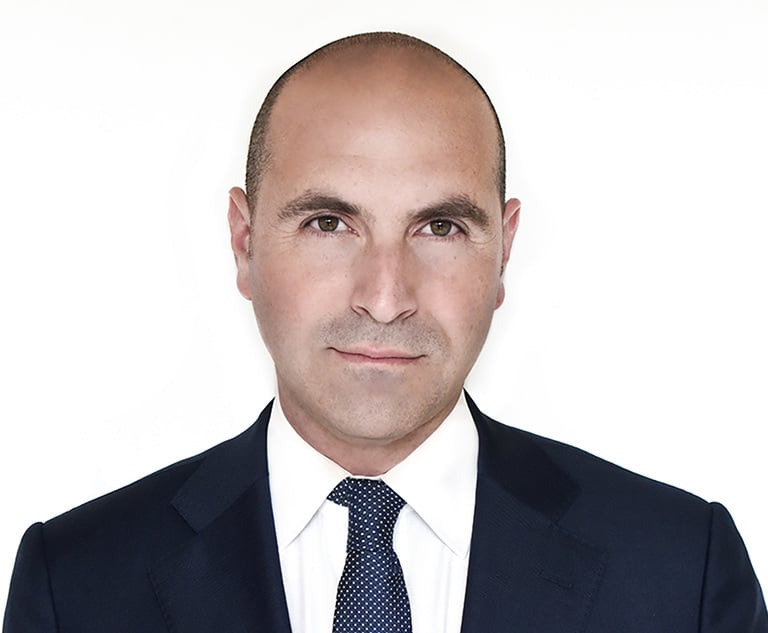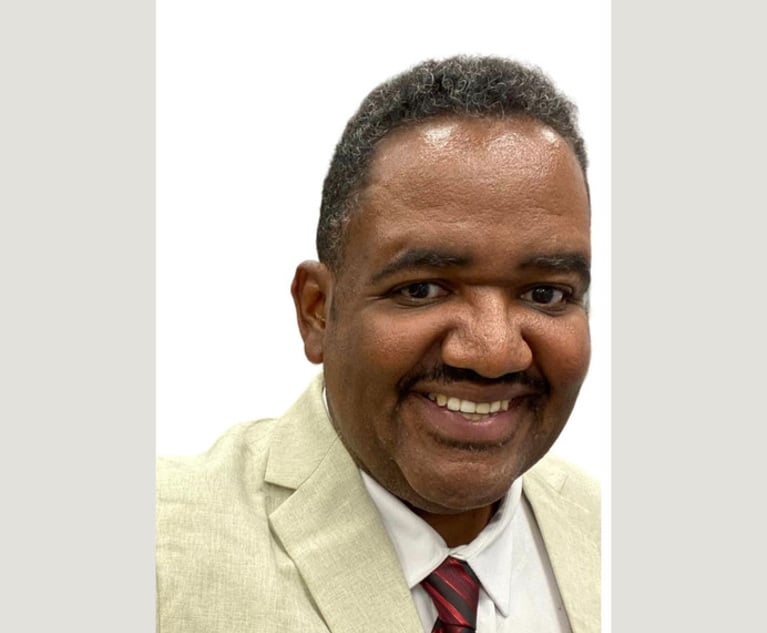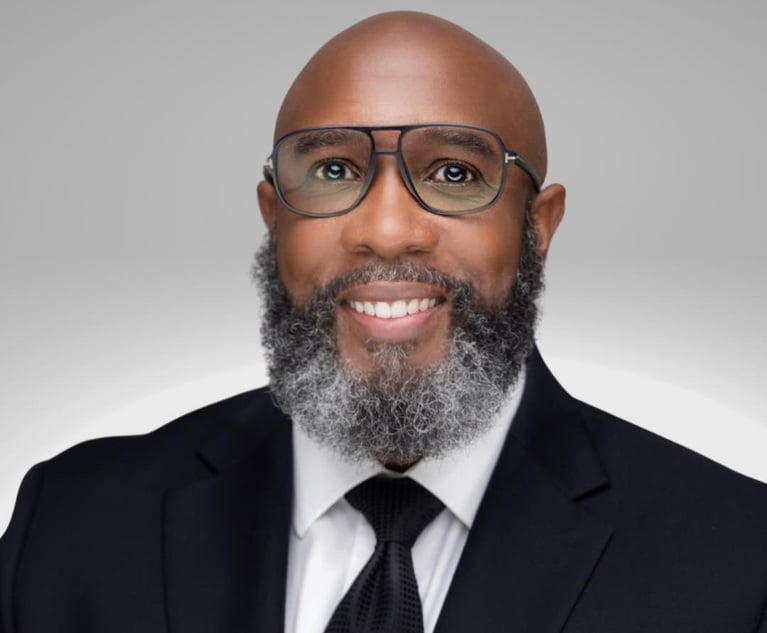 Barbara Prager, Executive Director of Coast to Coast Legal Aid in Plantation. Courtesy photo.
Barbara Prager, Executive Director of Coast to Coast Legal Aid in Plantation. Courtesy photo.Legal Aid Superhero Barbara Prager on Hanging up Her Cape
As longtime Coast to Coast Legal Aid Executive Director Barbara Prager prepares to retire, she reflects on the decades she spent advocating for disadvantaged clients, without the money or resources to climb out of legal holes.
December 14, 2018 at 03:38 PM
7 minute read
Before Barbara Prager provided free legal representation and advice as executive director of South Florida nonprofit Coast to Coast Legal Aid, she entered law school with a humble goal.
“I wanted to change the world,” Prager quipped.
Specifically, Prager wanted to change the world of the working class by doing her bit to even the playing field.
“I really thought that low-income persons should have the same access to justice as anyone else,” she said. “I believed everybody should get a fair shot and wanted to do something that would improve the lives of other people.”
That mindset, according to Prager, was the inevitable result of growing up when she did, where she did. America in the 1960s was a turbulent era, as Prager recalls it, fraught with political assassinations, anti-war protests and cultural revolutions.
“I was a bit of a rebel during those times,” she said.
Prager was among protesters in Washington D.C., marching against the Vietnam War with a busload of her New Jersey classmates.
 Anti-war protest against the Vietnam War in Washington, D.C. on April 24, 1971, at the corner of Pennsylvania Avenue and 10th Street Northwest. Photo: Credit: Leena A. Krohn via Wikimedia Commons.
Anti-war protest against the Vietnam War in Washington, D.C. on April 24, 1971, at the corner of Pennsylvania Avenue and 10th Street Northwest. Photo: Credit: Leena A. Krohn via Wikimedia Commons.
“It was my generation that was primarily being affected,” she said. “There were individuals that were not at school so they couldn't get a deferment. So a lot of my contemporaries were going to war and either not coming back, or coming back seriously injured.”
Suffice it to say, the legal aid field called Prager's name before she was ever part of its office. When she wasn't stalking New York's Broadway scene, dropping in for reruns of ”Phantom of the Opera” and “Cats,” Prager was working on her mission of justice for all. An internship at a legal aid clinic in Harlem only hardened her resolve.
But Prager's graduation paralleled a hiring freeze in New York's legal aid workforce, of all things, so she had to concoct a Plan B — personal injury law.
“I hated it,” Prager said. ”It wasn't bad for me to try something else because it just confirmed what I wanted to do. But I didn't get any personal satisfaction from it. It was just a way to earn a paycheck.”
Cue Florida, home of Prager's parents at the time and a seemingly tropical paradise compared with New York's unforgiving winters. Prager and husband Frank Estok packed their things and hot-footed out of there.
“I don't think we took into account that we were not going to have a life of leisure, that we were going to have to work and earn a living, so it was a little bit different than we had anticipated,” Prager said.
In 1982, Prager landed a job at Legal Aid Service of Broward County, a sister agency of Coast to Coast, both public interest law firms focused on education and advocacy for people at a legal disadvantage.
Prager soon joined Coast to Coast, where she specialized in elder law, representing senior citizens in civil litigation. She loved it, but realized it wasn't for everyone.
“You have to want to do this kind of work,” Prager said. “Seniors have a tendency when they're asked a question to just go back and talk to you about their entire history. They often will not answer a direct question, so you really do have to have a lot of patience. But you also have to be a little bit firm, to cut them off when you need to and get the information that you need, or you'd be there all day just getting the facts.”
 Nursing home. Photo: Fred Froese/iStockphoto.com.
Nursing home. Photo: Fred Froese/iStockphoto.com.
Many of Prager's clients faced threats of foreclosure, issues with health care or veteran benefits, or were being sent to nursing homes prematurely.
Prager once represented a woman in her 80s who'd applied to become an American citizen but was too unwell to go to a mandatory interview.
“She essentially was homebound, so she wasn't able to go to the immigration office,” Prager said. “We tried to get her an interview by request and we were not successful, so we ended up filing a federal lawsuit to get her a special accommodation.”
Prager succeeded, securing an interview and subsequent naturalization ceremony with immigration officials at the woman's home.
“That was really neat, to see somebody who wasn't just homebound, but was sitting in a chair with her feet up and really did not have the ability to even move around her own home, and yet she was able to become a citizen,” Prager said.
Another landmark case for Prager involved a dozen seniors who'd been scammed into signing a long-term service contract for medical alert devices.
“It's essentially a very expensive 911 call,” Prager said.
Prager's clients had bought the device to wear around their neck or pinned to their clothes in case of an emergency, when they could press a button and be connected with a first responder. But what those senior citizens hadn't realized was that they couldn't afford it.
“Often, seniors will be very trusting and they may sign documents that they haven't read or cant read because of failing eyesight,” Prager said. “They tend to listen to people, and in this particular case the sales people would go in and say things like, 'You remind me so much of my father or mother,' gaining the senior's trust and getting them to go along with whatever it was that they were offering.”
Prager filed a lawsuit against the company, eventually driving it out of Broward.
The best part of the job, for Prager, is seeing a client's reaction after a win.
“They tend to be extremely grateful,” Prager said. “Very different than a paying client would be, because a paying client would not have that same appreciation.”
In addition to senior law, Coast to Coast works on family law cases, navigating divorce and child support issues, as well as protecting domestic violence victims from abusers. Its economic advocacy and public health unit connects people with food stamps, social security and reemployment.
For the last 15 years as director, Prager has supervised all litigation and secured vital funding from sources across the U.S. Prager will pass the torch to Patrice Paldino on Dec. 31, and looks forward to doing nothing for at least six months.
“I don't think I've had any time in my life that wasn't structured,” Prager saiid. “But I don't think I would have been happy if I'd have done something else with my legal career.”
Though Prager may not have changed the world, many Broward residents would likely say she's changed theirs.
|
Barbara Prager
Born: June 1948, Morristown, New Jersey
Spouse: Frank Estok
Education: New York Law School, J.D. 1974; State University of New York at Binghamton, B.A., 1970.
Experience: Executive director, Coast to Coast Legal Aid of South Florida, 2004-present; Supervising attorney, Legal Aid Service of Broward County, 1984-2004; staff attorney, Legal Aid Service of Broward County, 1982-1984.
More attorney profile stories:
This content has been archived. It is available through our partners, LexisNexis® and Bloomberg Law.
To view this content, please continue to their sites.
Not a Lexis Subscriber?
Subscribe Now
Not a Bloomberg Law Subscriber?
Subscribe Now
NOT FOR REPRINT
© 2024 ALM Global, LLC, All Rights Reserved. Request academic re-use from www.copyright.com. All other uses, submit a request to [email protected]. For more information visit Asset & Logo Licensing.
You Might Like
View All
Growing Referral Network, Alternative Fees Have This Ex-Big Law’s Atty’s Bankruptcy Practice Soaring
5 minute read
Against the Odds: Voters Elect Woody Clermont to the Broward Judicial Bench
4 minute read
Miami Civil Judge Myriam Lehr to Say Goodbye to the County Court Bench
4 minute readTrending Stories
- 1Call for Nominations: Elite Trial Lawyers 2025
- 2Senate Judiciary Dems Release Report on Supreme Court Ethics
- 3Senate Confirms Last 2 of Biden's California Judicial Nominees
- 4Morrison & Foerster Doles Out Year-End and Special Bonuses, Raises Base Compensation for Associates
- 5Tom Girardi to Surrender to Federal Authorities on Jan. 7
Who Got The Work
Michael G. Bongiorno, Andrew Scott Dulberg and Elizabeth E. Driscoll from Wilmer Cutler Pickering Hale and Dorr have stepped in to represent Symbotic Inc., an A.I.-enabled technology platform that focuses on increasing supply chain efficiency, and other defendants in a pending shareholder derivative lawsuit. The case, filed Oct. 2 in Massachusetts District Court by the Brown Law Firm on behalf of Stephen Austen, accuses certain officers and directors of misleading investors in regard to Symbotic's potential for margin growth by failing to disclose that the company was not equipped to timely deploy its systems or manage expenses through project delays. The case, assigned to U.S. District Judge Nathaniel M. Gorton, is 1:24-cv-12522, Austen v. Cohen et al.
Who Got The Work
Edmund Polubinski and Marie Killmond of Davis Polk & Wardwell have entered appearances for data platform software development company MongoDB and other defendants in a pending shareholder derivative lawsuit. The action, filed Oct. 7 in New York Southern District Court by the Brown Law Firm, accuses the company's directors and/or officers of falsely expressing confidence in the company’s restructuring of its sales incentive plan and downplaying the severity of decreases in its upfront commitments. The case is 1:24-cv-07594, Roy v. Ittycheria et al.
Who Got The Work
Amy O. Bruchs and Kurt F. Ellison of Michael Best & Friedrich have entered appearances for Epic Systems Corp. in a pending employment discrimination lawsuit. The suit was filed Sept. 7 in Wisconsin Western District Court by Levine Eisberner LLC and Siri & Glimstad on behalf of a project manager who claims that he was wrongfully terminated after applying for a religious exemption to the defendant's COVID-19 vaccine mandate. The case, assigned to U.S. Magistrate Judge Anita Marie Boor, is 3:24-cv-00630, Secker, Nathan v. Epic Systems Corporation.
Who Got The Work
David X. Sullivan, Thomas J. Finn and Gregory A. Hall from McCarter & English have entered appearances for Sunrun Installation Services in a pending civil rights lawsuit. The complaint was filed Sept. 4 in Connecticut District Court by attorney Robert M. Berke on behalf of former employee George Edward Steins, who was arrested and charged with employing an unregistered home improvement salesperson. The complaint alleges that had Sunrun informed the Connecticut Department of Consumer Protection that the plaintiff's employment had ended in 2017 and that he no longer held Sunrun's home improvement contractor license, he would not have been hit with charges, which were dismissed in May 2024. The case, assigned to U.S. District Judge Jeffrey A. Meyer, is 3:24-cv-01423, Steins v. Sunrun, Inc. et al.
Who Got The Work
Greenberg Traurig shareholder Joshua L. Raskin has entered an appearance for boohoo.com UK Ltd. in a pending patent infringement lawsuit. The suit, filed Sept. 3 in Texas Eastern District Court by Rozier Hardt McDonough on behalf of Alto Dynamics, asserts five patents related to an online shopping platform. The case, assigned to U.S. District Judge Rodney Gilstrap, is 2:24-cv-00719, Alto Dynamics, LLC v. boohoo.com UK Limited.
Featured Firms
Law Offices of Gary Martin Hays & Associates, P.C.
(470) 294-1674
Law Offices of Mark E. Salomone
(857) 444-6468
Smith & Hassler
(713) 739-1250







